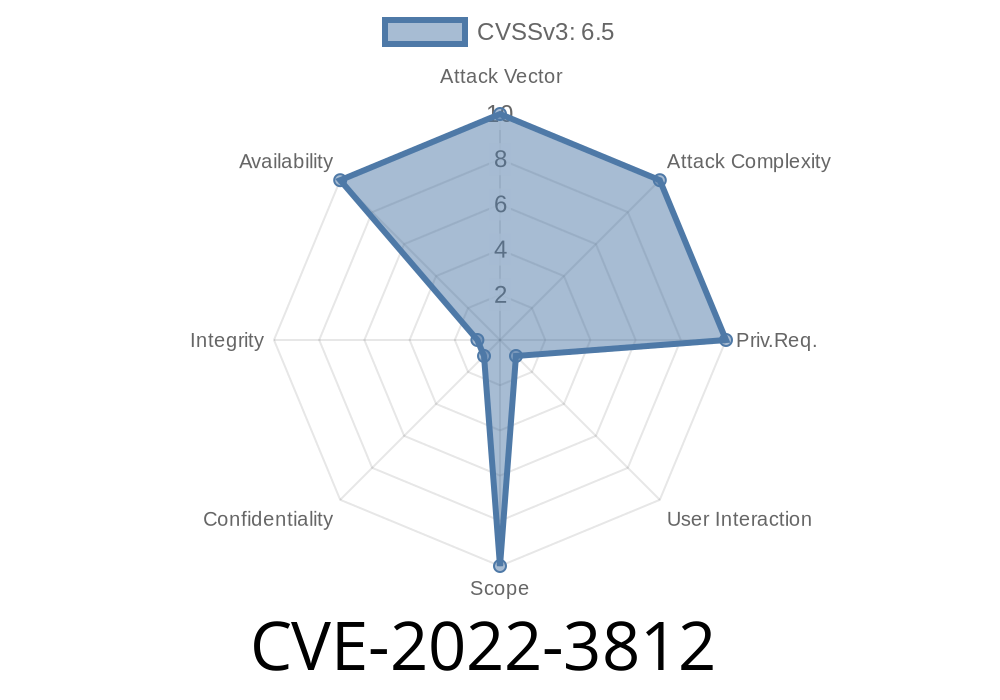A new vulnerability, CVE-2022-3812, has been identified in Axiomatic Bento4, specifically within the mp4encrypt utility. This issue involves a memory leak in the function AP4_ContainerAtom::AP4_ContainerAtom. While it may sound like a minor bug, memory leaks can be a real headache, especially for services that process untrusted files over the network. In this post, we'll break down how this bug works, walk through the code, reference official advisories, and even explain how attackers can exploit it in the real world.
What is Bento4 and mp4encrypt?
Bento4 is an open-source C++ library and tools for reading, writing, and manipulating MP4 files. One of its popular command-line utilities is mp4encrypt, which is used to apply encryption to MP4 files.
The vulnerable function is
AP4_ContainerAtom::AP4_ContainerAtom
This function is responsible for the creation of container atoms in an MP4 file structure. According to the VulDB entry (VDB-212678), a flaw in this function causes it to improperly manage memory under certain malformed input conditions, leading to a memory leak.
The Technical Details
A memory leak occurs when a program allocates memory but fails to release it back to the system after its use. Over time, especially with repeated or automated attacks, the application can become sluggish or even crash.
In *Bento4*, an attacker can craft a specially-made MP4 file which, when processed with mp4encrypt, will trigger the vulnerable code path in AP4_ContainerAtom::AP4_ContainerAtom.
Here’s a simplified code snippet illustrating the kind of logic that leads to the issue
AP4_ContainerAtom::AP4_ContainerAtom(AP4_UI32 type, AP4_UI32 size, AP4_ByteStream& stream)
: AP4_Atom(type, size)
{
// ... (simplified) ...
while (stream.HasData() && !parse_error) {
AP4_Atom* child = ParseAtom(stream); // Memory allocated here
if (!child) {
parse_error = true;
break;
}
// Oops, in some error paths, 'child' is NOT deleted!
children_.push_back(child);
}
// On error exit & some edge cases, leak occurs.
}
If the loop breaks early (for example, due to a malformed atom), previously allocated AP4_Atom pointers may not get cleaned up, causing a leak.
Impact
- Remote Exploitation: Attackers can remotely launch the attack by uploading or passing crafted MP4 files to any service or app using mp4encrypt.
- DoS Potential: Though not a classic remote code execution, repeated attacks may degrade service or crash it, leading to Denial of Service (DoS).
- Widespread Risk: Any system using an unpatched Bento4 mp4encrypt for file processing (like online video platforms) is potentially vulnerable.
Exploit Example
An exploit for this issue is public (see references below), but here’s a simple demonstration of how it works:
Example command
mp4encrypt malicious.mp4 out.mp4
If you monitor system memory while running the above repeatedly, you’ll notice the mp4encrypt process slowly consumes more memory than usual, eventually leading to a crash.
Here’s a publicly disclosed PoC
# Save this as leak.mp4 (manually hex-edit needed parts), then:
# mp4encrypt leak.mp4 out.mp4
# Monitor memory usage
# Due to the nature of the bug, arbitrary malformed atoms usually suffice.
Mitigation Steps
1. Update Bento4: If you use Bento4, especially mp4encrypt, update to the latest patched version. Check Bento4’s downloads or their GitHub page.
2. Validate Inputs: Never trust MP4 files from untrusted sources. Use file type validation before processing.
Credits & References
- Vulnerability Database: Vuldb VDB-212678
- CVE Entry: NIST NVD - CVE-2022-3812
- Project Issue (with PoC): Bento4 GitHub Issue #720
- Bento4 Official Website: https://www.bento4.com/
Conclusion
CVE-2022-3812 might seem small compared to RCE bugs, but memory leaks are often the first sign of deeper problems—and can take down crucial services if not fixed. Stay safe: patch your systems, validate your inputs, and watch your logs.
If you found this post helpful, share it with your team and make sure no one is running unpatched Bento4 utilities in production!
Timeline
Published on: 11/01/2022 22:15:00 UTC
Last modified on: 11/02/2022 19:00:00 UTC
